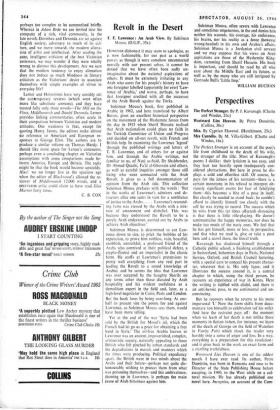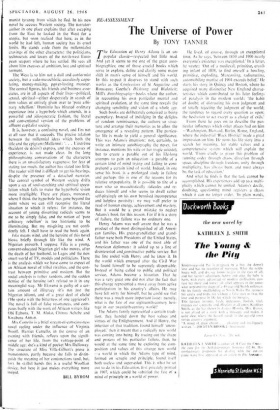Perspectives
The Perfect Stranger. By P. J. Kavanagh. (Chatto and Windus, 21s.) Westward Lies Heaven. By Petru Dumitriu. (Collins, 30s.)
Iska. By Cyprian Ekwensi. (Hutchinson, 25s.) Mrs Cantello. By M. Villa-Gilbert. (Chatto and Windus, 16s.) The Perfect Stranger is an account of the poet's life from childhood to the death of his wife, the stranger of the title. Most of Kavanagh's poems I dislike: their lyricism is too easy, and they lean too heavily upon inadequately con- sidered abstractions. But here in prose he dis- plays a cold and effortless skill. Of course, he pays for the iciness of his restraint—there is a certain monotony in his refusal to interpret ob- viously significant events for fear of falsifying them—this becomes a bite of a pose in itself. But clearly he needed to stand back; he couldn't afford to identify himself too closely with the self he was trying to record. The success which he wins from this (at times affected) distancing is that there is little role-playing. He doesn't sentimentalise the happy memories, nor does he make too much of the nasty ones. We feel that he has got himself, more or less, in perspective, and that what we read is, give or take a pout here and a scowl there, the literal truth.
Kavanagh has shadowed himself through a Catholic public school, a finishing establishment in Switzerland, bohemian days in Paris, National Service, Oxford, and British Council lecturing, with a special care to conceal his present charac- ter, whatever that is. His only lapse, and it illustrates the success around it, is a central chapter in which, using the third person, he recounts an experience of war, in Korea. Here the writing is riddled with cliché, and there is an anti-heroic pose, to me sentimental and un- convincing.
But he recovers when he reverts to his more impersonal 'I.' Now the form shifts from docu- mentary (on himself) to celebration (of his wife). And here the restraint pays off: the moment when we learn of her death is not unlike those moments in fiction (when, for instance, we learn of the death of George on the field of Waterloo in Vanity Fair) which shock the leader very harshly into a sense of anger and loss. In a way, everything is a preparation for this revelation : and it gives back to the work an exact form and a startling truthfulness.
Westward Lies Heaven is one of the oddest novels I have ever read. Its author, Petru Dumitriu, was born in Rumania and rose to be Director of the State Publishing House before escaping, in 1960, to the West while on a cul- tural mission. He has already published one novel here, Incognito, an account of the Com- munist tyranny from which he fled. In his new novel he accuses Western society. The narrator- author in one place explains that after escaping from the East he looked in the West for a utopia, but soon realised that here, as in the world he had left, human society has its cruel limits. He stands aside from the millennialist cravings of the other characters: the politicians, technocrats and lovers of the north-west Euro- pean seaport where he has settled. He sees all about him excesses of ambition, lust and spiritual torment.
The West is to him not a dull and conformist society, but a sado-masochistic, ceaselessly copu- lating, money-making, pgwer-lusting monster. The central figures, his friends and business asso- ciates, are in all aspects of their lives—political, sexual, spiritual—either desperately in search of firm values or entirely given over to 'pure arbi- trary rebellion.' Dumitriu has bloated ordinary experience into a hyperbole which amends, in a powerful and idiosyncratic fashion, the literal and conventional version of the problems of affluent capitalist society.
It is, however, a confusing novel, and I'm not at all sure that it succeeds. The precise relation between the millennial ideas which both the title and the epigram (Mallarme: . . L'extreme Occident de &sirs') express, and the excesses of experience, is not -made clear. In the long philosophising conversations of the characters there is an unsatisfactory vagueness; for fear of stating too much. the author has stated too little. The reader will find it difficult to get his bearings, despite the presence of a detached narrator. The central symbol of Western society drifts upon a sea of soul-searching and spiritual specu- lation which fails to make the hyperbolic vision more intelligible. There are places, moreover, where [ think the hyperbole has gone beyond the point where we can still recognise the literal situation to which it refers: for instance, the account of young dissenting radicals seems to me to be simply false, and the notion of 'pure arbitrary rebellion' is too histrionic to be illuminating. But my misgiving are not confi- dently felt. I shall have to read the book again.
Iska means wind, and the heroine of this novel blows briefly through life like the wind. A Nigerian proverb, I suppose. Filia is a young, convent-educated Nigerian girl who moves, after the death of her husband, to Lagos and the new smart world of TV, models and politicians. There is the analysis which we have come to expect of an African novel of tribal rivalries, and the con- trast between primitive and modern. But the social analysis is rather random, and the sudden demise of the heroine isn't related to it in any meaningful way. Mr Ekwensi is guilty of a cer- tain amount of illiteracy tit's not just the Nigerian idiom), and of a great deal of cliché ('lie spoke with the bitterness of one aggrieved'). The novel is full of false resonances, and com- pares badly with the work of African writers like Obi Egbuna, T. M. Aluko, Chinua Achebe and Kwabena Annan.
Mrs Cantello is a brief stream-of-consciousness novel reeling under the influence of Virginia Woolf. Harriet Cantello, in the course of an evening with friends, reflects upon the signifi- cance of her life, from the vantage-point of middle age; she's a kind of pocket Mrs Dalloway. The structure of Miss Villa-Gilbert's prose is monotonous, partly because she fails to distin- guish the meaning of her conjunctions (and, but, for). In skilful hands this is a useful Woolfian device, but here it just makes everything more insipid.
BILL BYROM































 Previous page
Previous page